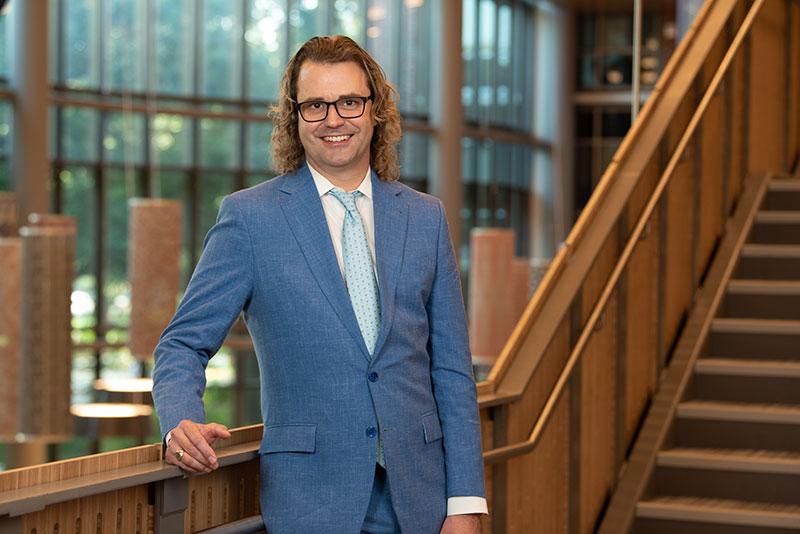Professor helped overturn Louisiana's same-sex marriage ban

Most people today take same-sex marriage for granted, but the legal right for LGBT couples to marry was established less than 10 years ago, and Chris Otten (BSM '05), professor of practice in business and legal studies, played a significant part in making it happen in Louisiana.
In 2013, the U.S. Supreme Court ruled that Section 3 of the Defense of Marriage Act was unconstitutional, clearing the way for plaintiffs from across the country to challenge statewide same-sex marriage bans. Otten was chair-elect of the Louisiana LGBT civil rights group Forum for Equality at the time, and he partnered with the law firm Stone Pigman to challenge the state’s ban on same-sex marriage. They weren't successful.
“We have the distinction of being the only federal case where we lost at the district court level,” laughs Otten.
That loss, however, set into motion a series of events with historic consequences.
A friend of Otten’s from college, Paul Kellogg, called him not long after and said there was a partner at his law firm that Otten should talk to. Douglas Hallward-Driemeier had served as an assistant to the solicitor general under President George W. Bush and had extensive appellate experience. Kellogg said Hallward-Driemeier would be willing to help Otten with legal strategy if their appeal of the Louisiana case ever made it to the Supreme Court.
“I had a conference call with the two of them and was just completely blown away,” Otten recalls. “I felt like this was the smartest lawyer I’d ever talked to.”
A few months later, after a number of federal district courts had found state same-sex marriage bans unconstitutional, the U.S. Court of Appeals in Cincinnati reversed a lower court ruling legalizing same-sex marriage, creating a split between districts that only the Supreme Court could resolve. The plaintiff group in the case asked Hallward-Driemeier to argue their case to the Supreme Court, and Hallward-Driemeier asked Kellogg to help write the brief.
“My friend ends up working on the brief through this random connection we made,” Otten says. “I went to Washington D.C. and met them on the steps after the argument was made, and it’s just one of those moments that still lives in my mind like it was yesterday.”
Less than two months later, on June 26, 2015, the Supreme Court issued its landmark decision in the case of Obergefell v. Hodges, legalizing same-sex marriage nationwide.
Despite that ruling, the right to marry wasn’t yet guaranteed in Louisiana. Gov. Bobby Jindal had earlier signed an executive order protecting opponents of same-sex marriage on the grounds of religious freedom, potentially giving clerks cover to deny issuing marriage licenses, and an advisory from the Louisiana Clerks of Court Association called for a delay of up to 25 days in issuing same-sex marriage licenses.
Otten was ready.
The day of the Supreme Court decision, he faxed a letter to the clerk of court in every Louisiana parish notifying them that if they were not in compliance with the Supreme Court’s decision by Monday morning, he would sue them personally for violating federal civil rights law, their government offices would not defend them, and they would be personally responsible for their attorney's fees. He shared the letter with The Times-Picayune, and it ran on the newspaper’s front page Monday morning.
No one pushed back.
“The genius of that strategy was, under Louisiana law, you can get married anywhere,” Otten says. “So if even one clerk caved — and there were dozens of them — then worst-case scenario, I can tell a couple they need to drive to a certain parish to get married.”
On June 29, 2015, Michael Robinson and Earl Benjamin Jr. got married in Orleans Parish Civil District Court, becoming the first same-sex couple to legally wed in Louisiana. Otten was proud to be there to witness their marriage.
Today, nearly 10 years later, Otten uses the case in his Legal, Ethical and Regulatory Environment of Business course to discuss a variety of legal issues, from standing, procedure and the appellate process to discrimination and civil rights.
But Otten also uses the case to emphasize the more personal lessons of the story, such as the importance of friendships in one’s professional career and the meaningful role that law can play in people’s lives.
“A federal judge told me, probably my first year out of law school, ‘You can’t change the world, but you can change people’s worlds,’” Otten says. “I tell my students all the time that if they really want to touch people and change their lives, that’s something they can still do. And no matter how dark the world may seem, there are battles being won every day for people that really need it, and that’s an awesome thing.”
Interested in advancing your education and/or career? Learn more about Freeman’s wide range of graduate and undergraduate programs. Find the right program for you.
Other Related Articles
- Politico: Trump administration moves closer to opening Venezuela to more US oil producers
- HuffPost: Psychologists Say Your Airplane Seat Choice Reveals Way More Than You Realize About Your Personality
- Quartz: What it would take for Trump to drag Big Oil back into Venezuela
- Harvard Business Review: Why AI Boosts Creativity for Some Employees but Not Others
- Forbes: How To Talk Politics With Family Over The Holiday
- AI-powered fund takes top prize in Aaron Selber Jr. Hedge Fund Course
- De Franco appointed Keehn Berry Chair of Banking and Finance
- The Wall Street Journal: For Trump, the Warner Megadeal Talks Are All About CNN
